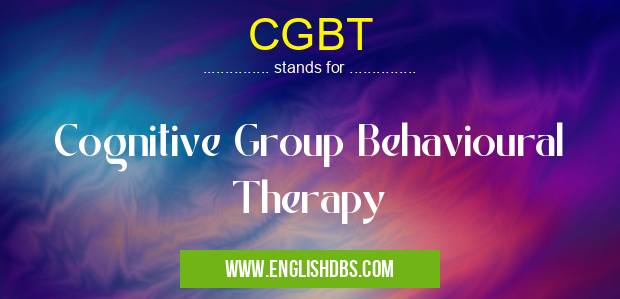What does CGBT mean in THERAPY
Cognitive Group Behavioural Therapy (CGBT) is a form of group therapy that focuses on recognizing and altering behaviors and thinking patterns to improve psychological health. CGBT combines cognitive-behavioral therapy, which is focused on changing maladaptive thought patterns, with interpersonal communication techniques that help participants understand their own behavior and the behavior of other members of the group.

CGBT meaning in Therapy in Medical
CGBT mostly used in an acronym Therapy in Category Medical that means Cognitive Group Behavioural Therapy
Shorthand: CGBT,
Full Form: Cognitive Group Behavioural Therapy
For more information of "Cognitive Group Behavioural Therapy", see the section below.
Essential Questions and Answers on Cognitive Group Behavioural Therapy in "MEDICAL»THERAPY"
What is Cognitive Group Behavioral Therapy?
Cognitive Group Behavioral Therapy (CGBT) is a type of psychotherapy designed for use in groups. It focuses on identifying and altering thoughts, beliefs, and behaviors associated with psychological distress. CGBT combines elements of cognitive-behavioral therapy and interpersonal dynamics to help clients understand their own behavior as well as that of other members in the group.
How does Cognitive Group Behavioral Therapy work?
In Cognitive Group Behavioral Therapy, the therapist will lead a group session focused on understanding how maladaptive thoughts and beliefs can impact behaviors and relationships. Through discussions, activities, or exercises, the therapist will encourage participants to explore how their thoughts influence their emotions, as well as how they interact with others. The therapist will also provide guidance so that each individual can learn new coping mechanisms to better manage their own emotions or those they encounter in their relationships.
Who can benefit from Cognitive Group Behavioral Therapy?
Individuals who suffer from anxiety or depression may find Cognitive Group Behavioral Therapy particularly beneficial due to its focus on managing cognitive distortions associated with negative thought processes. Additionally, people struggling with relationship issues might find value in being able to learn more about themselves through observations of others in the group setting.
What are common topics discussed in Cognitive Group Behavioral Therapy?
Common topics discussed during sessions include identifying cognitive distortions like all-or-nothing thinking patterns; practicing healthy communication techniques; understanding how thoughts affect feelings; learning coping skills for dealing with stressful situations; understanding individual differences between members; developing empathy for other members' experiences; exploring potential areas for improvement within personal relationships; setting achievable goals; building positive self-esteem; recognizing triggers or warning signs associated with distressful emotions or situations; and exploring ways to prevent relapse into unhealthy patterns once treatment has been completed.
Final Words:
Overall Cognitive Group Behavioral Therapy is an effective method for helping individuals recognize and alter maladaptive habits in order to achieve greater mental wellness overall. CGBT provides a supportive environment where individuals can observe themselves as well as others while learning new tools for improving psychological wellbeing from qualified professionals in an evidence based therapeutic approach.
